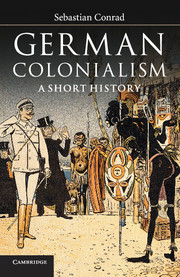Book contents
- Frontmatter
- Contents
- Illustrations
- Maps
- Acknowledgements
- Chapter 1 Introduction
- Chapter 2 Colonialism before the colonial empire
- Chapter 3 Pressure groups, motivations, attitudes
- Chapter 4 The German colonial empire
- Chapter 5 The colonial state
- Chapter 6 Economy and work
- Chapter 7 Colonial society
- Chapter 8 Knowledge and colonialism
- Chapter 9 The colonial metropole
- Chapter 10 Colonialism in Europe
- Chapter 11 German colonialism and its global contexts
- Chapter 12 Memory
- Chapter 13 Selected readings
- Index
- References
Chapter 8 - Knowledge and colonialism
Published online by Cambridge University Press: 05 June 2014
- Frontmatter
- Contents
- Illustrations
- Maps
- Acknowledgements
- Chapter 1 Introduction
- Chapter 2 Colonialism before the colonial empire
- Chapter 3 Pressure groups, motivations, attitudes
- Chapter 4 The German colonial empire
- Chapter 5 The colonial state
- Chapter 6 Economy and work
- Chapter 7 Colonial society
- Chapter 8 Knowledge and colonialism
- Chapter 9 The colonial metropole
- Chapter 10 Colonialism in Europe
- Chapter 11 German colonialism and its global contexts
- Chapter 12 Memory
- Chapter 13 Selected readings
- Index
- References
Summary
In recent years, prompted by the rise of postcolonial studies and the interrogation of the cultural roots of colonialism, an intense debate has taken place about the relationships between power, knowledge, and the scholarly disciplines in the colonial context. Edward Said’s critique of Orientalism and of the western ‘order of knowledge’ as an epistemological precondition for imperialism was central to the development of this debate. From the late eighteenth century onwards, European expansion went hand in hand with an explosion of interest in the world outside Europe and in exploring that world. Initially this took the form of travel reports, but it soon moved into academic disciplines as well.
That knowledge and power are closely linked has been a paradigmatic assumption of historians building on the work of Michel Foucault. This insight also applies to colonial history. Generating knowledge about the countries outside Europe was a necessary precondition for colonial conquest; but the colonial experience, conversely, also left its traces in the different forms of western knowledge. Knowledge and scholarly research were not instruments of neutral, ‘objective’ description. Rather, they could not and cannot be separated from hierarchies of power and mechanisms of rule. At its most self-evident, this means that academic research made an indispensable contribution to the European conquest of the world. Engineering, land surveying, weapons technology, vaccination and medical research, legal theories, Oriental studies, ethnology, linguistics – the entire arsenal of academic disciplines was pressed into service for the territorial conquest of the planet.
- Type
- Chapter
- Information
- German ColonialismA Short History, pp. 124 - 135Publisher: Cambridge University PressPrint publication year: 2011



